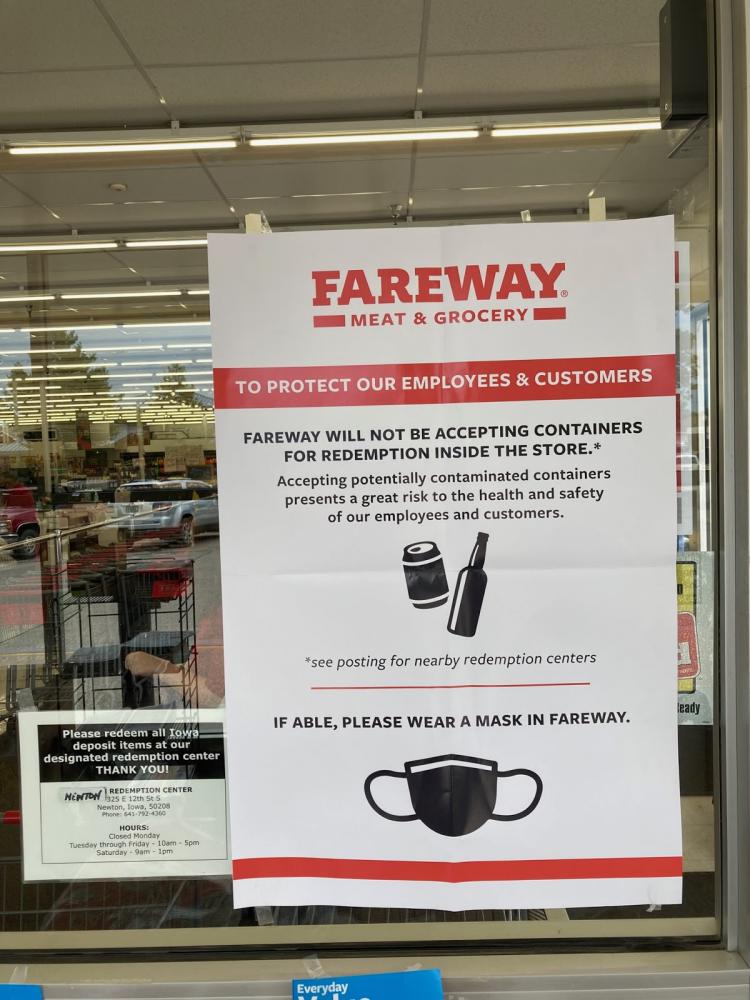Battle of Bottle Bill grows as moratorium is lifted

MICHAEL CRUMB Aug 7, 2020 | 3:38 pm
4 min read time
914 wordsAll Latest News, Government Policy and Law, Retail and Business
Reynolds halted the redemption of bottles and cans in March as the coronavirus began to spread across Iowa. That restriction remained in place until the end of July.
Resuming the collection of bottles and cans was met with disappointment by grocery stores and the Iowa Grocery Industry Association, which has long fought to eliminate the state’s “Bottle Bill,” enacted 41 years ago to reduce litter and keep containers out of landfills, citing primarily health concerns over accepting dirty bottles and cans.
In a cumbersome financial arrangement, it’s far from profitable, with stores pocketing a penny on each container they handle. If a distributor does not reimburse stores the full nickel that is paid to customers when containers are returned, stores recoup even less.
One company, Fareway Meat & Grocery, opposed the moratorium being lifted and said it would not participate. According to state code, stores that refuse to accept cans or bottles can be charged with a simple misdemeanor, punishable by up to a $625 fine.
The exception is if a store has a redemption center certified by the Iowa Department of Natural Resources collecting bottles and cans on their behalf, said Alex Murphy, director of communications for the DNR. Stores also must “prominently display” information about the redemption centers. Centers that fail to comply also can be charged and fined, the same as a store.
It’s up to local law enforcement to enforce the law, Murphy said, but Paul Parizek, the public information officer at the Des Moines Police Department, said he’s not sure if Des Moines police have ever responded to a complaint about the Bottle Bill.
“In all my years, I do not ever recall being called to investigate a complaint of a business not accepting cans,” said Parizek, who’s been with the department for more than 15 years. “Asking around the building, I can’t find a single cop who has.”
Emily Toribio, a Fareway spokesperson, said the company believes it is in compliance with state law.
“We do not feel that the steps we have taken are unlawful,” she said.
She said the company’s stores have redemption center information posted in every location, and “customers are encouraged to support these local centers by taking their containers to these businesses.”
At the heart of the debate, though, is what Fareway and the Iowa Grocery Industry Association say is the inequitable enforcement of the law and an inconsistent process for certifying redemption centers.
In a statement given to the Business Record, officials with the industry group said grocery and convenience stores have “shouldered the burden for all retailers selling redeemable beverages.”
“[They] are being held to the letter of the law while other retailers are not,” the statement read. “Many other types of retailers, vendors and institutions sell but refuse to take back cans and bottles without fear of enforcement, while grocers are threatened with penalties. The law is not enforced in an equitable manner. Some retailers are being held accountable while others are not.”
Examples of stores that aren’t required to accept cans and bottles they sell are home improvement and dollar stores, among others.
Toribio said another issue is how the DNR implements rules to certify redemption centers using what is called a “convenience standard.”
“The DNR has failed to implement rules … in order to determine what constitutes a ‘convenience’ as it pertains to the convenience standard,” she said in an emailed statement. “This has resulted in the DNR approving and denying redemption centers and acting without proper authority.”
Toribio said Fareway often takes in cans and bottles that are sold elsewhere.
“Not only is the current system bringing trash into our stores, in certain areas, we were taking in more cans and bottles than we sold,” Toribio said. “This is because of the inequities in the system. There are many retailers refusing to take cans – this adversely puts Fareway’s customers and employees at increased risk, as we were accepting trash other retailers sold and refused to take back.”
Fareway and other companies are seeking further guidance on the issue, Toribio said, but the grocery association earlier this year filed a petition for a declaratory judgment ordering the DNR to “follow its own procedures outlined … for agency actions that affect the rights and duties of the citizens of Iowa.”
Michelle Hurd, president of the group, said the DNR decides convenience based on the discretion of its staff, and that the “convenience standard … was never uniformly or consistently applied and all done without public input or scrutiny as required by law.”
Amie Davidson, land quality bureau chief for the DNR, said the agency was still reviewing the petition.
Then there are the well-publicized concerns about public health, particularly during the pandemic, grocery industry representatives said.
“From the onset of the pandemic, retailers have had to make some tough decisions to keep employees and customers safe,” the statement from the industry association read. “While retailers always have had concerns about how to deal with these containers and the sanitation challenges they pose, these concerns have escalated during the pandemic.”
Photo: A sign in the window of the Fareway Meat & Grocery store in Newton alerts customers that the store doesn’t accept cans and bottles. Photo contributed by Fareway.









